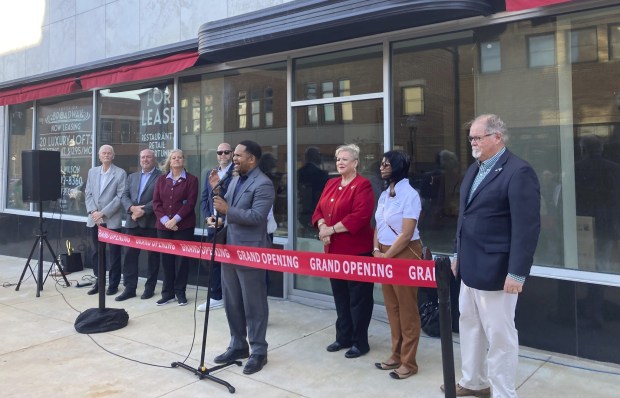While everyone would like to think their story is important, that’s especially true for those impacted by the opioid/fentanyl epidemic that has become a national crisis.
As a journalist who’s covered this issue locally for over a dozen years, I have spoken to countless victims, including those who were abusing drugs, their loved ones and the professionals in the trenches determined to make a difference. Yet the number of overdoses, including fatalities, continues to rise at an alarming rate. As of 2022, an estimated 14.5 opioid-related deaths occurred for every 100,000 residents of Kane County.
Which is why we should enthusiastically applaud the Kane County Health Department’s newly-launched “Your Story Matters” campaign that encourages people impacted by opioids to share their experiences as a way of providing education and resources but also to help destigmatize drug abuse.
And that’s critical, says Dr. Stephen Holtsford, a former ER doctor who switched his specialty to addiction medicine in 2017 after seeing the same people come through his doors “again and again” with too little hope and far too much shame.
Plus, he added, “we were poorly equipped to take care of them.”
What Holtsford quickly discovered is “if you treat them as people with an illness, they will get better.” Unfortunately, he added, ”we just did not have the bandwidth to treat them all because there is so much stigma around” opioid abuse.
“On a scale of one to 10, we are about halfway there,” he replied when asked how far we’ve come in comparing drug addiction to other serious medical conditions such as cancer or diabetes. Unfortunately, too many in the community still criticize “harm reduction” programs that distribute the life-saving nasal spray naloxone or fund needle exchange programs because they believe the addicts are “doing it to themselves.”
Try telling that to Lyndsay Hartman who, as street outreach case manager for Association for Individual Development, knows how often “users become the first responders” because they have naloxone on them “and can save each other.”
“I hear it from people all the time … they deserve to die,” she said, then quickly points to the bad choices we all make, such as eating too much fast food, drinking to excess or smoking cigarettes. Yet we don’t “dehumanize people” for doing these “socially acceptable things” as we do drug abusers.
Overdose deaths “are soaring, so obviously we are not doing enough,” Hartman insisted. “The (drug) supply is so contaminated, so unregulated. We need to get more radical if we want to save lives.”
The good news is that, although addiction is a complicated condition, it is “readily treatable,” especially in Kane County, which has a stronger support system in place than most areas, insisted Holtsford, who is medical director of two St. Charles treatment centers, sits on the Kane County Opioid Task Force and continues to “work with ERs to improve the care of patients with opioid abuse disorder.”
While the “treatment landscape is getting better … it still needs so much work,” he added. Even in a county that has plenty “to be proud of … building infrastructures and changing attitudes takes a long time.”
No one knows that more than those who have lost loved ones, including Don Kalish, retired vice president of finance for Rush Copley Medical Center in Aurora, whose 29-year-old son Randy died of a fentanyl overdose in 2016.
That phone call shook him and wife Roberta to the core because they had no idea how serious his problem was, he told me. In fact, a week before their son died, the couple, who were paying $200 an hour for private counseling for him, had asked each other the tough question: Are we doing enough?
“We knew he drank and had Xanax issues, but was getting promotions at work and was an active member of the family,” said Don Kalish, adding that, while “there is always some guilt in these deaths, we did not second guess” our response.
What the couple did was get involved with Path to Recovery Foundation – Roberta became a coach, Don is president of the board – which offers weekly virtual family support meetings and counseling at a greatly reduced cost.
They are also among local people featured in the “Your Story Matters” campaign that is centered around the unique experiences of those with close ties to the opioid epidemic. To accompany this series of video testimonies, the Kane County Health Department will launch a social media campaign encouraging people to share their testimonies under the #YourStoryMatters hashtag.
The hope, noted Kane County Health Department Executive Director Michael Isaacson, is that “others who can relate will feel less alone and more comfortable reaching out and getting the help that is available.”
While recovery is “not an easy process,” insisted Kalish, “there are pathways to success.”
It’s a statement backed by another storyteller in this campaign named Penny, who has been drug-free for five years but spoke candidly in her testimonial video about “the war going on in my head all the time” that made it so hard to stop using, even when she knew it led to shame, guilt and remorse.
She also spoke eloquently about the other side to addiction – recovery. And Penny encouraged viewers to “grab a hold of it like a drowning person grabs a life preserver, because that is exactly what it is.”
It is indeed a story that matters. And I encourage you to hear more by going to www.overdoseinfo.org. Even if you are lucky enough to have never been impacted by addiction, it’s worth the listen because your heart might just be opened a little bit to the struggles of your Fox Valley neighbors.
Those 60 to 70 fatal overdoses a year in Kane County are just “the tip of the iceberg,” insisted Holtsford, referring to the countless times people who are overdosing get saved, which are cases that might never get reported.
“Dampening the stigma remains a challenge but we are moving in the right direction,” he continued. “The successes are key and we have to share them.”
dcrosby@tribpub.com




